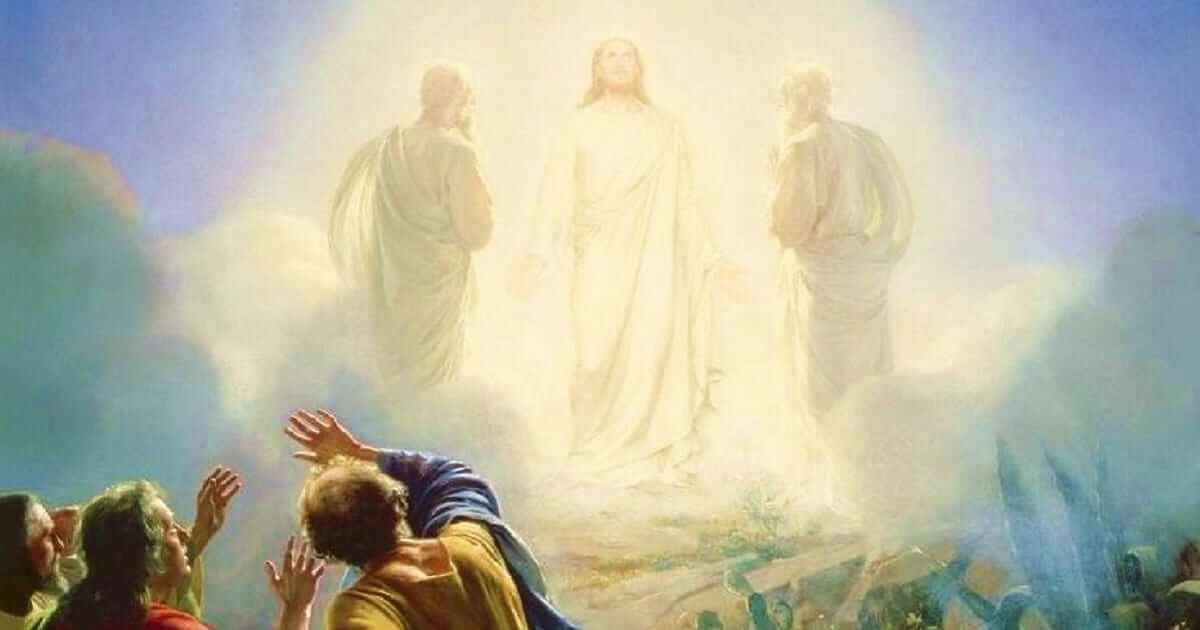To accompany your Come Follow Me study for April 10-16
In addition to reading the indicated chapters, you may wish to:
- Read the applicable portions of the New Testament Institute Student Manual at
- https://www.churchofjesuschrist.org/study/manual/new-testament-student-manual/introduction-to-matthew/chapter-5?lang=eng
- https://www.churchofjesuschrist.org/study/manual/new-testament-student-manual/introduction-to-matthew/chapter-6?lang=eng
- https://www.churchofjesuschrist.org/study/manual/new-testament-student-manual/introduction-to-mark/chapter-12?lang=eng
- https://www.churchofjesuschrist.org/study/manual/new-testament-student-manual/introduction-to-mark/chapter-13?lang=eng
- Watch the following related video segments:
- Come Follow Me (April 10-16) Matthew 15-17; Mark 7-9 | Expect the Unexpected at (1) Come Follow Me (April 10-16) Matthew 15-17; Mark 7-9 | Expect the Unexpected – YouTube
- Thou Art the Christ, The Son of God at https://www.youtube.com/watch?v=-BZkhVbWVY4
- Whosoever Will Lose His Life for My Sake Shall Find It at https://www.youtube.com/watch?v=JHsNsyxpxQc
- The Gospel According to Matthew (from minute 2:00:47 to 2:23:32) at https://www.youtube.com/watch?v=woAhReBytBk&t=6494s
- The Gospel of Mark Visual Bible (from minute 32:08 to 48:43) at https://www.youtube.com/watch?v=BcdgY7V4jZ4&t=1190s
If you would like a Kahoot game related to this material which you could use for personal study or use with your family or your class, click here: https://create.kahoot.it/share/matthew-15-17-mark-7-9/50853b06-fa4c-4879-915c-056115d47787. (To use it with a group, after clicking on this link, you will need to log into Kahoot, creating a free account if you have not done so previously, then click on the blue “Start” button.)
Points to Ponder in Matthew 15-17; Mark 7-9
1. How can you defend Jesus against the charge that He was uncharacteristically rude in today’s reading in that He:
- Called a Canaanite woman a dog? (Matthew 15:26)
- Called His chief apostle, Peter, “Satan” and “an offence unto me”? (Matthew 16:23)
- Spit on the non-functional eyes of a poor blind man? (Mark 8:23)
- Called the Jewish religious leaders “hypocrites” (Matthew 15:7) as well as “wicked and adulterous” (Matthew 16:4) and “blind leaders of the blind” (Matthew 15:14)?
- Called the people in general “a faithless and perverse generation”? (Matthew 17:17)
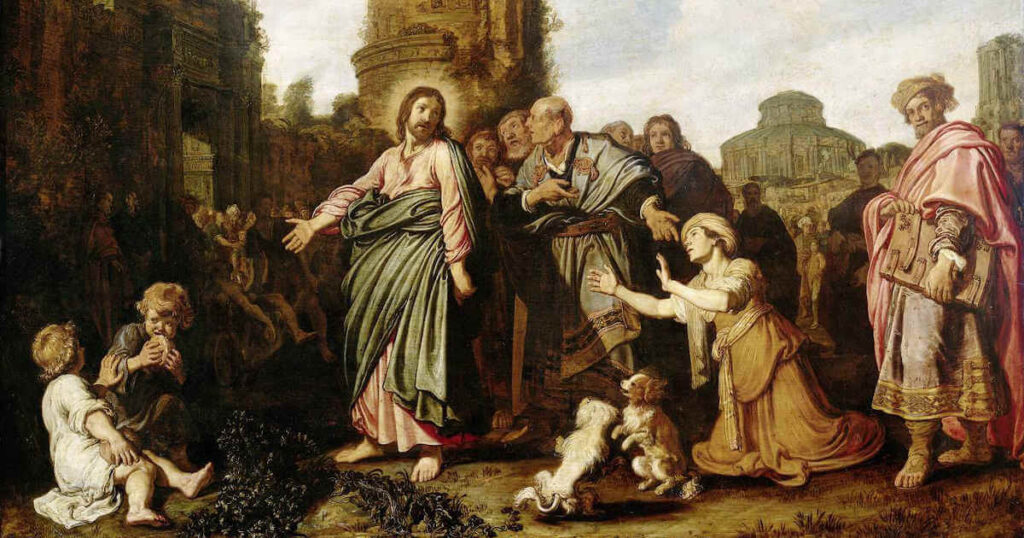
2. Why did Jesus say (Matthew 15:24) that He was sent only to the lost sheep of the house of Israel? Isn’t He the Savior of the entire world?
3. Jesus’ feeding the four thousand in Matthew 15:32-38 sounds very much like the account of His feeding five thousand. What evidence do we have that they are not just two versions of the same event, with one of the versions miscounting the diners by 1000?
4. Why was “leaven” such an appropriate analogy to the “doctrine” of the scribes and pharisees? (Matthew 16:11-12)

5. What grammatical error can you find in Matthew 16? What possible benefit could come from pointing it out?
6. If it’s true that nothing that goes into the mouth defiles a man, why do we have a “Word of Wisdom”? (Matthew 15:11)
7. Why do Latter-day Saints reject the Catholic interpretation of Matthew 16:18, when Jesus quite clearly calls Simon by his new name of Peter, which means rock, and tells him that “upon this rock I will build my church”?
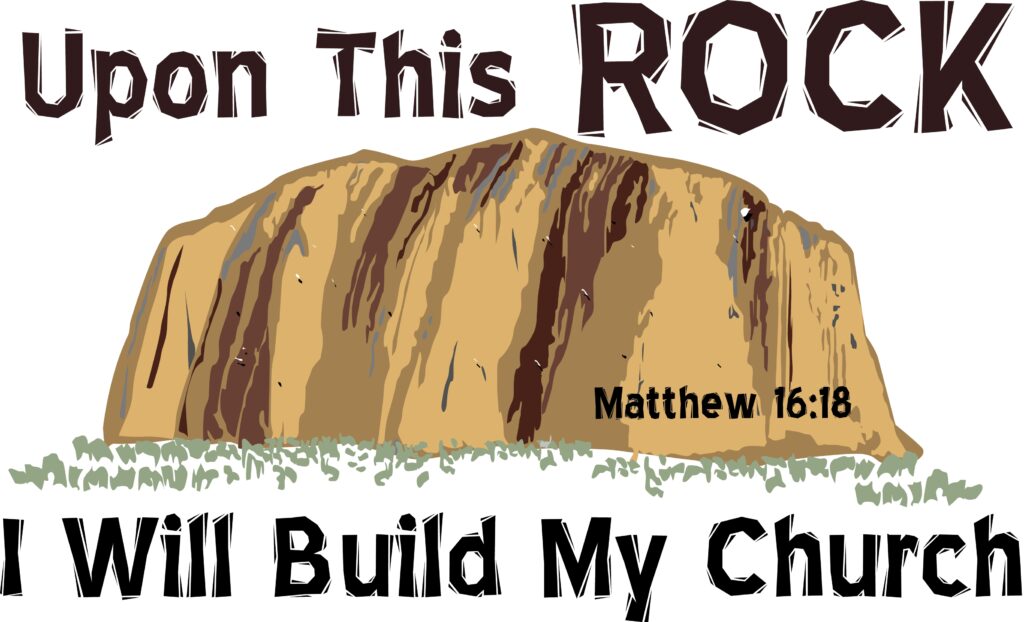
LIST A PASSAGE FROM THIS WEEK’S READING THAT COULD BE HELPFUL IN EACH OF THE FOLLOWING SITUATIONS:
8. A friend has been going to psychiatrists for three years and has experimented with everything from drugs to yoga trying to “find himself.”
9. A non‑member friend argues that Jesus himself never set up a church and never intended that his followers be regimented by a formal institutional structure. The organizational aspects of Christianity, he maintains, originated with Paul and are foreign to the simple message of faith and love which Jesus taught. [
10. You find that your associates at work are having such a negative influence on you and are subjecting you to such temptations and harassment because of your religion that you wonder if you’ll be strong enough to resist.
11. Your little brother was promised in his patriarchal blessing that he would serve a mission in this life, but he has contracted cancer, and despite your prayers and the administration of the elders his condition has continued to deteriorate.
12. You find your friend’s arguments convincing when he asserts that it is not only permissible but obligatory for a committed Latter‑day Saint to withhold payment of that portion of his income tax which would be used for what he considers to be unrighteous purposes, such as financing abortions.
13. Your missionary companion is pressuring you to be less timid about proclaiming the gospel in every available situation. He specifically recommends that you stand up on buses to take advantage of the captive audience and that you visit worship services and study classes offered by other churches and there proclaim the restored gospel to those who are being subjected to the false teachings of others.
14. A friend challenges you to find any scriptural authority whatever for believing in marriage in the hereafter.
15. You have just read the following in an anti‑Mormon publication and wonder how to answer it: “When all of the evidence is in and the Mormons are down, beaten at every turn, their followers will use this … dodge, ‘There is one piece of evidence you can never destroy: I have had a personal testimony from God that the Book of Mormon is true.’ This seems very real and convincing to them. But this is not the way God has worked. He sent the New Testament with many, many, many proofs of its validity, such as the prophecies it fulfilled, the resurrection of Jesus, the sense it made of Hebrew ritual and many other verifications. God did not give each individual a ‘personal revelation’ as the only proof!” (Larry Jonas, Mormon Claims Examined. Grand Rapids: Baker Book House, 1965, pp. 64‑65.)
16. A Baptist friend who is reading the Book of Mormon for the first time thinks the story of the Three Nephites who were not to taste of death is a little far‑fetched.
17. Someone claims in elders’ quorum meeting that what the Savior meant when he taught the faith can move mountains is that those with enough faith will secure enough shovels and dump trucks to haul the mountain away.
18. A friend contends that our Church cannot be true because he found evidence in a book that Joseph Smith once had a fist fight with his brother William.
THE TRANSFIGURATION
Answer each of the following true/false questions and then indicate which one you believe to be the most important. Answers to most of the questions can be found in the following sources: Matt. 17, Mark 9, and the related material from the Institute New Testament Student Manual at https://www.churchofjesuschrist.org/study/manual/new-testament-student-manual/introduction-to-matthew/chapter-6?lang=eng.
19. The transfiguration most probably took place on Mt. Hermon, at night.
20. Of Jesus’ disciples, only Peter, James, and John witnessed the transfiguration.
21. Not only Jesus but his apostles were transfigured.
22. Peter, James, and John received their endowments on the Mount of Transfiguration.
23. In connection with the transfiguration, Peter, James, and John had their calling and election made sure.
24. The Joseph Smith Translation adds nothing of significance to the transfiguration account.
25. On the Mount of Transfiguration Peter, James, and John received the keys of the kingdom from Moses, Elijah, and Jesus.
26. There is some evidence that John the Baptist may have been present at the Transfiguration.
27. Moses and Elijah were both translated beings when they appeared at the transfiguration.
28. According to the Biblical account, Jesus forbade his apostles ever to speak of the transfiguration experience, but they apparently couldn’t restrain themselves from relating at least part of the experience following the Savior’s resurrection.
Possible Answers to Points to Ponder in Matthew 15-17; Mark 7-9
1. How can you defend Jesus against the charge that He was uncharacteristically rude in today’s reading in that He:
- Called a Canaanite woman a dog? (Matthew 15:26)
Jesus was most likely testing the woman’s faith or giving her a trial to help her faith grow. She passed with flying colors!
- Called His chief apostle, Peter, “Satan” and “an offence unto me”? (Matthew 16:23)
This was strong language, but probably necessary to help a strong-willed Peter recognize that it was not his place to counsel the Son of God but to take counsel from his hand.
- Spit on the non-functional eyes of a poor blind man? (Mark 8:23)
Quite possibly this was also a test of the faith of the blind man and/or a catalyst to his faith, being a physical symbol of the treatment Jesus was about to miraculously perform on his eyes.
- Called the Jewish religious leaders “hypocrites” (Matthew 15:7) as well as “wicked and adulterous” (Matthew 16:4) and “blind leaders of the blind” (Matthew 15:14)?
Strong language again, but it was important to help Jesus’ disciples fully understand how apostate the Jewish leaders were and how important it would be not to follow their lead.
- Called the people in general “a faithless and perverse generation”? (Matthew 17:17)
Again, it was important to help Jesus’ followers realize that they needed to be different from those in the world.
2. Why did Jesus say (Matthew 15:24) that He was sent only to the lost sheep of the house of Israel? Isn’t He the Savior of the entire world?
Jesus is indeed the Savior of the entire world, but His mortal ministry, given the limitations of means of communication and transportation at that time, had to be limited to the literal descendants of Abraham, Isaac, and Jacob. They were thus honored as the “chosen people” because of the righteousness of their illustrious ancestors. Unfortunately, they did not live up to the standards of their progenitors. After Jesus’ death, the gospel was soon authorized to be taken to the Gentiles and all the world.
3. Jesus’ feeding the four thousand in Matthew 15:32-38 sounds very much like the account of His feeding five thousand. What evidence do we have that they are not just two versions of the same event, with one of the versions miscounting the diners by 1000?
To begin with, there are different numbers of fish and loaves of bread given for the beginning quantity at each event and different numbers of baskets collected afterwards. But most conclusively, in Matthew 16: 9-10, Jesus clearly speaks of the two events as separate.
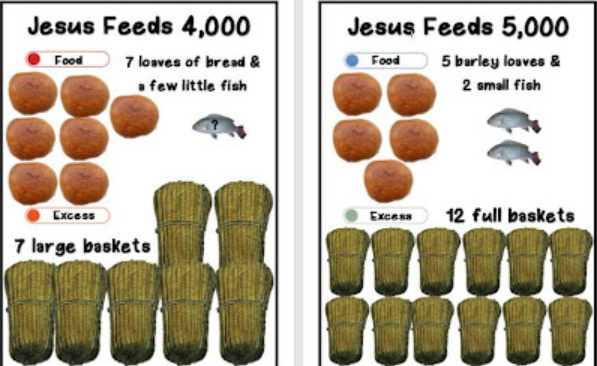
4. Why was “leaven” such an appropriate analogy to the “doctrine” of the scribes and Pharisees? (Matthew 16:11-12)
Elder Bruce R. McConkie wrote: “Literally, leaven is a substance that produces fermentation, as for instance yeast which causes bread to rise. Figuratively, leaven is any element which, by its fermenting, spreading influence, affects groups of people so that they believe and act in particular ways. Thus to beware of the leaven of the Pharisees and Sadducees is to shun their false doctrines, their concept that the Messiah must prove his claim to divinity by signs, for instance. Similarly, today, the warning is to beware of the leaven of any group whose false doctrines and antichrist philosophies work to keep men from accepting the truths of the restored gospel” (Doctrinal New Testament Commentary, 1:379).
5. What grammatical error can you find in Matthew 16? What possible benefit could come from pointing it out?
Matthew 16:13 quotes Jesus as saying, “Whom do men say that I the Son of man am?” To be grammatically correct, it should say “Who?” rather than “Whom?” This could be a useful point to mention to any who take issue with our 8th Article of Faith, which says we believe the Bible to be the word of God so far as it’s translated correctly. Most other English translations of this verse use the proper pronoun.
6. If it’s true that nothing that goeth into the mouth defiles a man, why do we have a “Word of Wisdom”? (Matthew 15:11)
There was no Word of Wisdom, as such, in Jesus’ day, of course. But even now, it is not the alcohol or coffee which defiles a person—it is his rebellion against God’s law, whatever it happens to be at the time. One who was served an alcoholic beverage without realizing it would not need to consider himself “defiled” by having unwittingly taken a sip of it.
7. Why do Latter-day Saints reject the Catholic interpretation of Matthew 16:18, when Jesus quite clearly calls Simon by his new name of Peter, which means rock, and tells him that “upon this rock I will build my church”?
As is explained in the Institute Student Manual, the word Jesus used for the “rock” upon which He would build His church was not the same word He used in naming Peter. And, certainly, if Jesus had intended to build the church upon an individual, He would have picked Himself. It would have been interesting to see Jesus’ gestures at the time He spoke on this subject. Could He have pointed at Peter, when He said, “Thou art Peter,” and at Himself when He said, “and upon this rock I will build my church”? Certainly, Helaman 5:12 indicates that “it is upon the rock of our Redeemer, who is Christ, the Son of God, that ye must build your foundation.”
However, Joseph Smith, through revelation, indicated that the “rock” Jesus was referring to on this occasion was actually the “rock of revelation.” Saying that the Church is built upon the Savior and that it is also built upon revelation are not two mutually exclusive ideas, since revelation, of course, is what connects the Church’s namesake with its earthly head.
LIST A PASSAGE FROM THIS WEEK’S READING THAT COULD BE HELPFUL IN EACH OF THE FOLLOWING SITUATIONS:
8. A friend has been going to psychiatrists for three years and has experimented with everything from drugs to yoga in an effort to “find himself.”
Mark 8:35-37. You best find yourself by forgetting yourself and focusing on the work of the Lord and service to others.
9. A non‑member friend argues that Jesus himself never set up a church and never intended that his followers be regimented by a formal institutional structure. The organizational aspects of Christianity, he maintains, originated with Paul and are foreign to the simple message of faith and love which Jesus taught.
Matthew 16:18 and 18:17 mention the church in connection with Jesus. He assures Peter, “I will build my church.” You could, if you wanted, discuss some of the reasons Jesus wants a formal organization in addition to the “simple message of faith and love.” Obviously, His work can go forward more efficiently with an organization. Organizations have an undeserved bad reputation in some circles today.
10. You find that your associates at work are having such a negative influence on you and are subjecting you to such temptations and harassment because of your religion that you wonder if you’ll be strong enough to resist.
Mark 9:43-48 says that it would be better to sever offensive relationships than have them lead you to hell. However, Matthew 17:20 says that for the faithful nothing is impossible, so it should be possible for you to resist the mentioned temptations without quitting work.
11. Your little brother was promised in his patriarchal blessing that he would serve a mission in this life, but he has contracted cancer, and despite your prayers and the administration of the elders his condition has continued to deteriorate.
Matthew 17:21. Some blessings come only through fasting and prayer. Most patriarchal blessings don’t specify that a given blessing must be received in this life, but if this does, the boy will surely be healed, if worthy, and if blessed by those with proper faith and works.
12. You find your friend’s arguments convincing when he asserts that it is not only permissible but obligatory for a committed Latter‑day Saint to withhold payment of that portion of his income tax which would be used for what he considers to be unrighteous purposes, such as financing abortions.
Matthew 17:27. Even Jesus paid taxes, so as not to antagonize the authorities, though He certainly wouldn’t have agreed with all they did with such taxes.
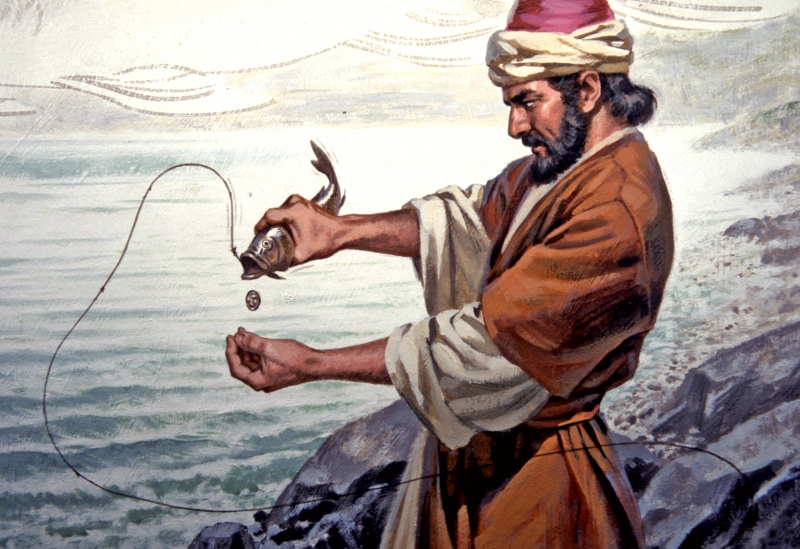
13. Your missionary companion is pressuring you to be less timid about proclaiming the gospel in every available situation. He specifically recommends that you stand up on buses to take advantage of the captive audience and that you visit worship services and study classes offered by other churches and there proclaim the restored gospel to those who are being subjected to the false teachings of others.
Matthew 17:27 once again suggests we not needlessly offend.
14. A friend challenges you to find any scriptural authority whatever for believing in marriage in the hereafter.
Matthew 16:19. Whatsoever is sealed on earth by proper authority will be sealed in heaven.
15. You have just read the following in an anti‑Mormon publication and wonder how to answer it: “When all of the evidence is in and the Mormons are down, beaten at every turn, their followers will use this … dodge, ‘There is one piece of evidence you can never destroy: I have had a personal testimony from God that the Book of Mormon is true.’ This seems very real and convincing to them. But this is not the way God has worked. He sent the New Testament with many, many, many proofs of its validity, such as the prophecies it fulfilled, the resurrection of Jesus, the sense it made of Hebrew ritual and many other verifications. God did not give each individual a ‘personal revelation’ as the only proof!” (Larry Jonas, Mormon Claims Examined. Grand Rapids: Baker Book House, 1965, pp. 64‑65.)
Matthew 16:16-19. Christ promised to build His church upon the principle of individual revelation and clearly indicates that was the only way Peter or anyone else could know for sure that Jesus is the Christ or that the gospel is true.
16. A Baptist friend who is reading the Book of Mormon for the first time thinks the story of the Three Nephites who were not to taste of death is a little far‑fetched.
Matthew 16:28. No more far-fetched than this promise of the Savior.
17. Someone claims in elders’ quorum meeting that what the Savior meant when he taught the faith can move mountains is that those with enough faith will secure enough shovels and dump trucks to haul the mountain away.
Certainly, we should couple our faith with works, but Matthew 17:20 seems to suggest that if conditions are right–i.e., if you have enough faith and if the Lord has instructed and authorized you to move a mountain–you can simply speak to it and it will voluntarily move! The book of Ether tells of such an experience in the life of the Brother of Jared, and there is no mention of shovels or dump trucks!
18. A friend contends that our Church cannot be true because he found evidence in a book that Joseph Smith once had a fist fight with his brother William.
William probably deserved it, even if he was an ordained apostle. But let’s grant that Joseph Smith could possibly have overreacted to whatever provocation his brother gave him. Joseph Smith never claimed to be perfect but that the revelations he received from God and the accounts he gave of his ordination by heavenly beings were true. We find evidence throughout the scriptures of mortal imperfections in those called by God to do His work. In this week’s reading we see the example of Jesus’ apostles, duly ordained by Him to carry on His work after Him, arguing with each other about who among them was to be the greatest. (Mark 9:33-37) It’s a bit reassuring to know that God is patient enough not to dismiss any of us from His work just because we show some human imperfections.
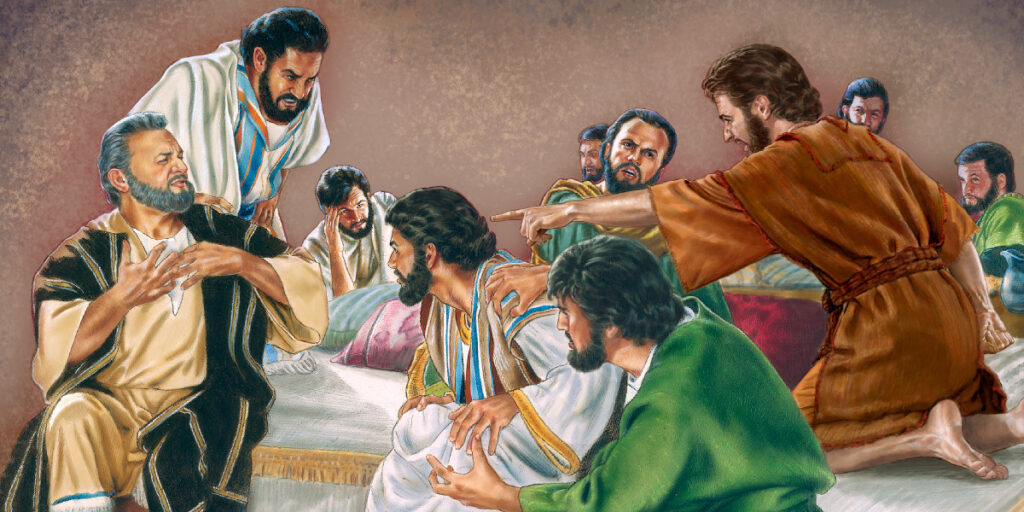
THE TRANSFIGURATION
Answer each of the following true/false questions and then indicate which one you believe to be the most important. Answers to most of the questions can be found in the following sources: Matt. 17, Mark 9, and the related material from the Institute New Testament Student Manual at https://www.churchofjesuschrist.org/study/manual/new-testament-student-manual/introduction-to-matthew/chapter-6?lang=eng.
19. The transfiguration most probably took place on Mt. Hermon, at night.
False. Through the years the Church’s Bible Dictionary has offered opinions favoring both Mt. Tabor and Mt. Hermon. The current edition is silent on the question, and Bible scholars are quite undecided. In any case, it evidently took place in the daytime, with a “bright cloud” at one point overshadowing them.
20. Of Jesus’ disciples, only Peter, James, and John witnessed the transfiguration.
True.
21. Not only Jesus but his apostles were transfigured.
True, according to Joseph Smith. See the related commentary in the Institute Student Manual.
22. Peter, James, and John received their endowments on the Mount of Transfiguration.
Joseph Fielding Smith believed this to be true. See his statement on the subject in the Institute Student Manual.
23. In connection with the transfiguration, Peter, James, and John had their calling and election made sure.
Quite possibly. This seems to be a possible conclusion from 2 Peter 1:16-19, and Elder Bruce R. McConkie believed it to be so. See his comments in the Institute Student Manual.
24. The Joseph Smith Translation adds nothing of significance to the transfiguration account.
False. See the JST version of Matthew 17:10-14. The old missionary lessons of 50+ years ago used to use Matthew 17:11 to try to prove that John the Baptist was predicted to return in the latter days as part of the restoration. As the JST makes clear, while John the Baptist functioned in the spirit and power of Elijah (Elias) in the meridian of time, and while he in fact did come as part of the restoration, that latter-day coming was not here foretold by the Savior. Holding only the keys of the Aaronic Priesthood, John the Baptist didn’t even have the authority to “restore all things.”
25. On the Mount of Transfiguration Peter, James, and John received the keys of the kingdom from Moses, Elijah, and Jesus.
Yes! This was the fulfillment of the promise made in Matthew 16 that the keys would be given. This is easily the most important fact about the Transfiguration.
26. There is some evidence that John the Baptist may have been present at the Transfiguration.
True. See the JST of Mark 9:4. It is equally certain that Elijah of old was present, giving keys that he alone could bestow. This JST passage is a bit puzzling, but Bruce R. McConkie interpreted it as evidence that John the Baptist may have been present in addition to Moses and Elijah. I have even wondered it maybe this was one of the JST passages with which Joseph Smith was still “experimenting” at the time of his death. He indicated that he never finished the work on the JST, and we know that he had to study things out in his mind and present ideas to the Lord for confirmation. Could this somewhat puzzling passage have been one where he might have intended to do additional work? Certainly, none of the other accounts of the transfiguration mention the presence of John, even in the JST. On the other hand, it could have been highly appropriate for John the Baptist to have been present, as a powerful witness to Peter, James, and John that not only were ancient prophets still very much alive but that John, too, was no worse off for having been decapitated by Herod.
27. Moses and Elijah were both translated beings when they appeared at the transfiguration.
True! Despite the assurance of Deuteronomy that Moses died, Latter-day Saints understand (in part from Alma 45:19) that Moses, like Elijah, was translated, probably so that he could come and lay real hands on the heads of the apostles on the Mount of Transfiguration prior to the resurrection.
28. According to the Biblical account, Jesus forbade his apostles ever to speak of the transfiguration experience, but they apparently couldn’t restrain themselves from relating at least part of the experience following the Savior’s resurrection.
False. He authorized them to speak of it after the resurrection. See Matthew 17:9.
